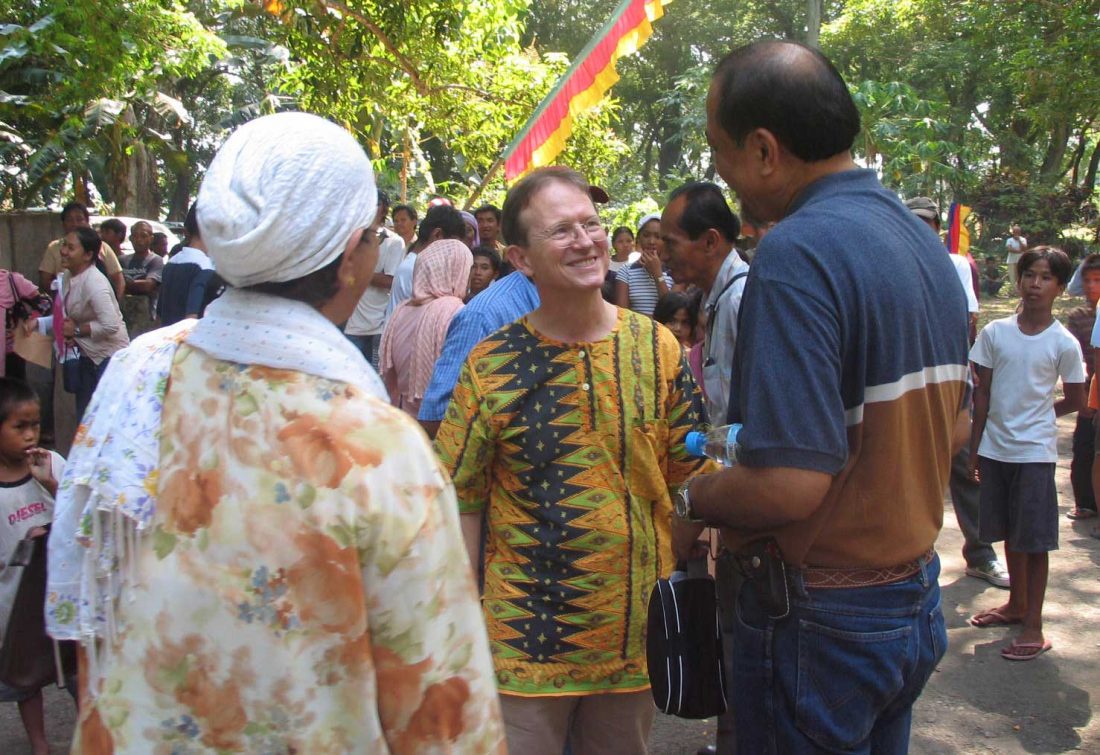After more than 17 years as The Asia Foundation’s Philippines country representative, I’m moving on to spend a year as a Distinguished Visitor at the Australian National University as part of the partnership between the two institutions.
Rood participates in a panel discussion at the Carnegie Endowment for International Peace on political approaches to development. Photo/Pete Marovich
I leave the Philippines with decidedly mixed emotions. On the one hand, I’ll have time to read and write, give a few lectures, and begin to try to make sense of what I’ve learned about the many aspects of the Philippines after almost 36 years of residence there. On the other hand, I will be absent from the country at an incredibly exciting and pivotal time. The election of the iconoclast President Rodrigo Roa Duterte has called into question not only the constitutional order (will the Philippines shift from a unitary to federalist system of government?) but also the regional order (as the Philippines distances itself from the United States). This will be my longest absence from the country in 35 years, and I will miss being close to the action—but I am confident that the resilience of the Filipino people will continue to be demonstrated in the face of trying times, and I’ll look forward to returning after a year to spend the rest of my life in the Philippines.
Partnership is essential to how we have been able to operate. When I joined in late 1999, concerns were growing about the levels of corruption in the Philippines, and many local and international organizations were enlisted to try to fight it. Social Weather Stations conducted diagnostic studies on the issue which have since evolved into an ongoing periodic survey of corruption as experienced by Philippine businessmen to track corruption levels over time. City-level work against corruption enlisted willing mayors and the private sector in improving governance and the business climate.
Journalists and academics deepened understanding of governance issues, and in Mindanao, a special focus on improving more rural municipal governments led to partnerships with academia, civil society organizations, and professional organizations—particularly in Muslim Mindanao.

Rood (center) speaks with participants during a grand kanduli (thanksgiving ritual feast) in Paidu Pulangi, Pikit, in 2007 to mark the end of a 21 year-old rido between two rival clans.
The desire for empirical knowledge has driven our work on conflict in the Philippines from the very start. A 2002 survey of households in conflict-affected areas of Mindanao unexpectedly demonstrated that the most common experience was not of insurgency-related violence but of feuds between clans (known as rido). This striking finding led to a series of groundbreaking studies of the phenomenon, and the collective research culminated in a book which won a National Book Award in 2016. These findings have been influential in helping to resolve feuds as the increased knowledge has led the media and security forces to cease mistaking a clan feud for insurgent activity, and thus treating the violence in a more appropriate way that was less likely to lead to escalation of the violence.
Similarly, specialized surveys in Mindanao have allowed Muslim Filipinos to have a statistically recognized voice on such matters as peace, conflict, the role of women, and the specific fate of peace agreements with the Moro Islamic Liberation Front. These results were shared with both government and MILF negotiators and made available to the broader public.
This set of interactions, networks, and knowledge enabled The Asia Foundation in 2009 to apply and be appointed to the International Contact Group (ICG) for the negotiations between the government and the MILF. This role gave us the ability to respond flexibly to particular issues in the negotiation—for instance, the issue of natural resources and revenue sharing—in ways that both parties found valuable. Then in 2013, as the process of implementing peace agreements began, I shifted from the ICG to the Third Party Monitoring Team (TPMT), whose mandate was to judge whether the Comprehensive Agreement on the Bangsamoro was being fulfilled. Similar opportunism was demonstrated when our work on clan feuds—with communities, religious leaders, and the like—came to the attention of the security forces who requested help in understanding and responding to community situations. As we became a trusted partner, our interaction with the Armed Forces of the Philippines led to a deepening involvement in security sector reform.
Political influences must always be taken into account when partnering (making sure that the Foundation is not perceived to be favoring one side or another, often by making grants to many different organizations), doing empirical work (understanding which influential actors will need what kind of information to work toward mutually agreed goals), and seizing opportunities (such as introducing reforms when the time is right). In all of these endeavors—whether persuading a mayor to support anti-corruption activities, supporting alcohol or tobacco tax reform, reporting to policymakers on public opinion toward peace and development, or working to ease the logistical concerns of inter-island shipping in this archipelago of 7,107 islands—it was not only the technical work that was necessary to succeed, but also ensuring that the alternatives provided were politically feasible.
Seventeen years is a long time—by far the longest single country stint in Asia Foundation history—and this blog can’t possibly do justice to all that the Foundation has accomplished in the Philippines, particularly all that the talented, passionate staff in Manila have done with their ability to utilize partnerships, knowledge, opportunism, and political nous. My time at The Asia Foundation will no doubt serve as the sub-stratum of what I’m able to accomplish in the future.
[Steven Rood is The Asia Foundation’s country representative in the Philippines. He tweets @StevenRoodPH. The views and opinions expressed here are those of the author and not those of The Asia Foundation or its funders.]
http://asiafoundation.org/2017/01/18/reflecting-17-years-country-representative-philippines/

No comments:
Post a Comment
Note: Only a member of this blog may post a comment.